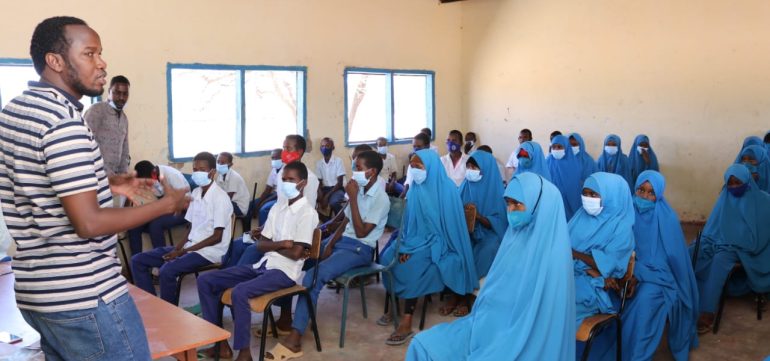
Many children around our project areas remain disadvantaged in their school environment either through inadequate teaching materials, lack of infrastructure, discrimination and violence. These conditions are not conducive to learning or development.
Children’s rights to survival, protection and education are under immediate threat. Children take the first steps in a lifelong learning journey.
All children have the right to be protected wherever they are — at home, in school, on the streets, and at all times — in times of peace or conflict or calamity. Their right to protection is as intrinsic to their well being, as is the right to survival, development and participation. Children deserve to live in an environment where good governance and the full enjoyment of human rights are mutually reinforcing.
The participation of children in all domains and actions that affect them is one of the pillars of APID’s protection program. APID believes that children are advocates for their rights. They are not only rights-holders in need of protection but also active members of society, capable of voicing their own rights. Our work on child participation is underpinned by the rights enshrined in the United Nations Convention of the Rights of the Child (UNCRC) – respect for the views of the child and the right of every child to express his or her views.
In practice, child participation means involving children meaningfully in all matters that affect their rights and well-being. For their participation to be meaningful, children need support, particularly in the form of access to education, as well as special training and briefings.
In the Horn of Africa, girls and young women face tremendous obstacles in realizing their basic rights. They experience multiple forms of discrimination and violence throughout their life, starting even before birth and continuing throughout childhood and adolescence. The consequences are far reaching and serve only to perpetuate cycles of discrimination and violence against future generations of both girls and boys. Situations of conflict and crises exacerbate violence against girls and women, depriving them of their human rights and from achieving their full potential as members of society.
Our Intervention Strategies
APID helps children on their way by designing, studying, supporting, and scaling up actions that enhance school readiness and success. We have a special focus on meeting the needs of children from poor and disadvantaged communities, engaging and supporting families, and building the capacity of educators and communities to sustain improvements.
Our programs provide tailored solutions to students facing multiple barriers to education to acquire relevant skills, creating opportunities for positive transitions to secondary school and dignified livelihoods. Our integrated approach is based on extensive research on what works to increase children’s learning outcomes, retention, and wellbeing.
APID works in partnership with governments, private sector, civil society, academic institutions, school managements, teachers, parents, communities, Child right champions, and children themselves to develop and scale affordable, innovative solutions that raise the quality and accessibility of public education systems for the most vulnerable children in the region. We work with Government line ministries and departments and school staff to improve the quality of teaching, strengthen supervisory capacity, and develop gender-transformative and inclusive policies and budgeting.
At the community level, we work with parents, traditional and religious leaders to shift negative gender and social norms affecting education outcomes,
Peer to peer learning methodology is at the centre of APID education programming. By giving youths the chance to learn from youth led mediums like workshops, sports, education, entertainment, and mentorship; we harness the full energy and potential of young people to impact themselves and their communities. For years this method has raised a new generations of budding entrepreneurs and community leaders.
APID’s new strategic framework embeds gender and protection issues into each of the five strategic priorities to promote gender awareness and sensitivity. We work to help children out of dangerous situations. We also work with communities to identify the roots of violence that lead to abuse, exploitation, trafficking, and other forms of violence against children. APID advocates at all levels for the rights of the girls and young women to be fulfilled and upheld. Our community-led systems approach to ending violence, combined with APID’s to End Violence campaign is catalysing movement of people committed to keeping children safe from harm.
When it comes to justice for children, APID works on two strands, providing support and guidance for children whose rights have been/are being violated and for children in direct contact with the law
| Summary of our approach |
| For Children in Crises situations and violence against children |
| DIRECT SUPPORT
APID focuses on vulnerable children and children in urgent need linking them to legal aid services, providing psychosocial and other vital support. Creating safe spaces for children. |
| MONITORING
We support and partner with investigative bodies to examine human rights violations, and abuses to children during and after crises. |
| ADVOCACY
Promoting the protection and the rights of children affected by crises at our project areas. Advocate and lobby at high levels for the elimination of all forms of violence and fighting the application of Maslaha on GBV and child right violations. |
| AWARENESS
As a preventive measure, we raise awareness about hidden issues surrounding SGBV, child abuse, FGM, early marriages and other harmful practices We organize capacity building events with children, parents, communities, and governments and train them about child rights protection. |
| CHILD PARTICIPATION
Empowering children with the knowledge of their rights and promoting their participation. We advocate for the inclusion and the active participation of children in all processes that affect them. |